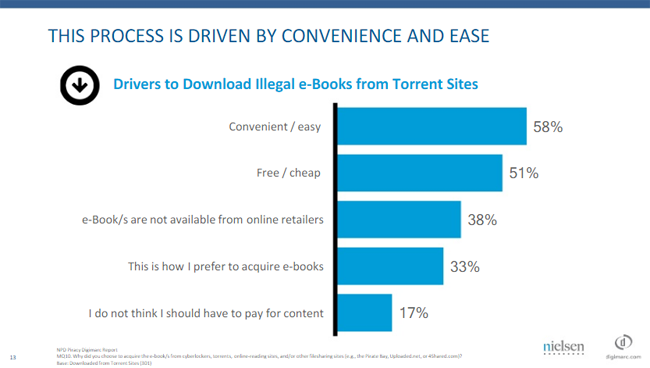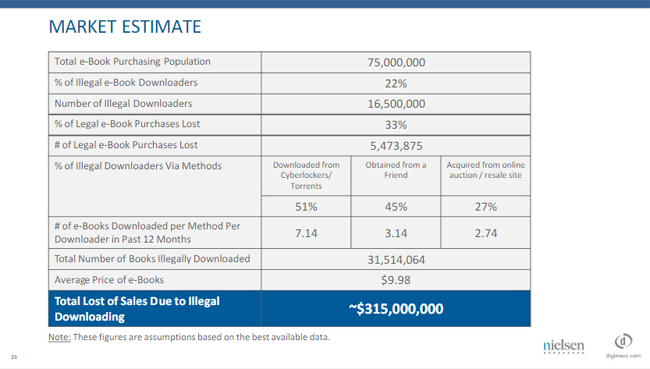 In 2017, people can download any digital content they like from the Internet, but that’s still most likely to be movies, TV shows and music. Bubbling underneath, however, is a steady demand for pirated eBooks.
In 2017, people can download any digital content they like from the Internet, but that’s still most likely to be movies, TV shows and music. Bubbling underneath, however, is a steady demand for pirated eBooks.
Ebooks are relatively cheap when compared to other digital content, but their handy file size and ubiquity ensures that millions of titles are just a few convenient clicks away.
A new study, commissioned by anti-piracy company Digimarc and conducted by Nielsen, aims to shine light on eBook piracy. It was presented yesterday at The London Book Fair and aims to better understand how eBook piracy affects revenue and how publishers can prevent it.
In previous studies, it has been younger downloaders that have grabbed much of the attention, and this one is no different. Digimarc reveals that 41% of all adult pirates are aged between 18 and 29 but perhaps surprisingly, 47% fall into the 30 to 44-year-old bracket. At this point, things tail off very quickly, as the remaining ~13% are aged 45 or up.
There are also some surprises when it comes to pirates’ income. Cost is often cited as a factor when justifying downloading for free, and this study has similar findings. In this case, however, richer persons are generally more likely they are to download.
Around 13% of pirates have an annual household income of under $30k, with those earning between $30k and $59k making up 19% of the total. At this point there is a sizeable leap, with 36% of pirates claiming to earn between $60k and $99k per annum. Around 29% make more than $100k a year.
Overall, the majority of illegal downloaders are relatively well-educated, with more than 70% having either graduated from college or in possession of a post graduate degree.
Taken together, this means that e-book pirates are often older wealthy people with a good education, which is probably close to the profile of the average ebook reader.

Also of interest are the methods used by pirates to obtain their eBook fix. Sharing joint top position with 31% are public torrent sites (such as The Pirate Bay) and cyberlocker sources such as 4shared or Uploaded.
These relatively high-tech solutions are closely followed by 30% who swap eBooks with friends using instant messaging, email or even flash drives. Just over a quarter acquire eBooks from places such as eBay, with an equal 27% obtaining from friends using services such as Dropbox.
Given the majority of pirates’ ability to pay, it comes as no surprise that convenience is the number one driver for people obtaining content from torrent sites. Cost still takes the number two position but a not inconsiderable four out of ten still believe that online retailers are lacking when it comes to content availability.

Nevertheless, plenty of pirates still frequent legal resources.
42% said that they buy eBooks from online platforms including Amazon and iTunes, with 32% going directly to the publishers’ own websites. Just shy of 30% access eBooks using a monthly subscription account such as Amazon Unlimited, while around a quarter frequent out-of-copyright resources including Gutenberg.org.
Part of Digimarc’s job is to help clients reduce the prevalence of illegal downloading and the study provides some pointers in that area too. The main takeaway is that if pirates can be convinced that their equipment is at risk from piracy (a common strategy lately), then a majority would reconsider to some degree.
A total of 49% said they would be ‘much less’ likely to download if that was the case, with 34% indicating they would be ‘somewhat’ less likely to do so. 18% indicated they wouldn’t change their habits at all. Similar numbers said the same about the risk of being caught, figures that drop only slightly when pirates are confronted with potential harm done to authors.
Finally, Digimarc has a stab at some market estimates. The company concludes that around 22% of eBook consumers pirate, taking away around 33% of the market at a cost of $315m.

“When it comes to book piracy, you can’t prevent what you can’t predict. This is the challenge for publishers as they grapple with preventing illegal piracy,” says Devon Weston, director, market development, Digimarc Guardian.
“Our new Nielsen data makes it clear these pirates don’t fit a typical criminal profile. They access digital content from a vast universe of web pages, social platforms and file sharing portals. Our aim is to break down the problem for publishers and help them develop an effective prevention strategy.”






